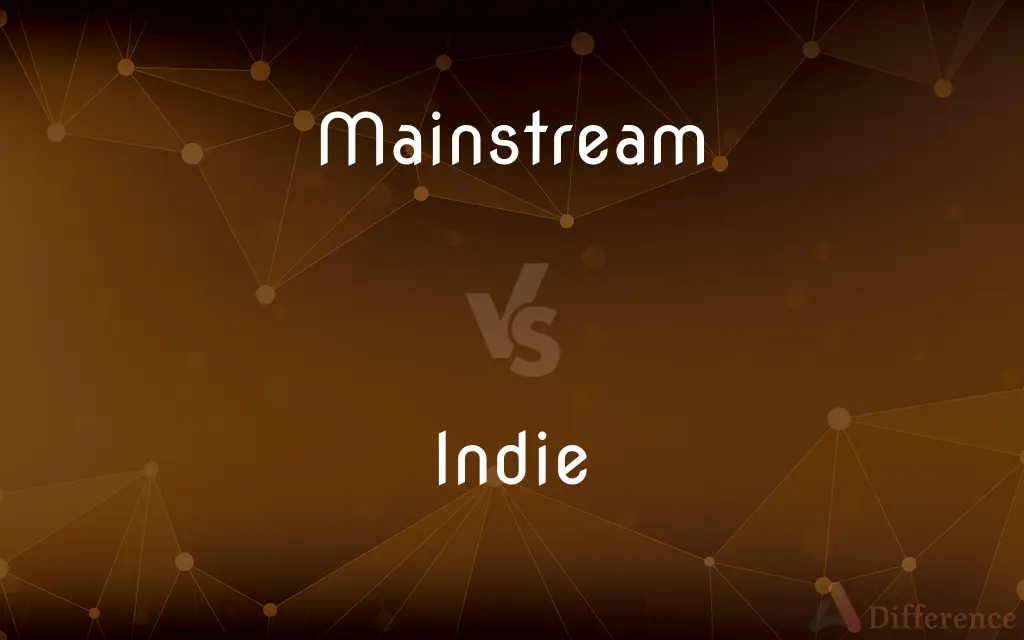Mainstream vs. Indie — What's the Difference?
By Tayyaba Rehman — Updated on October 25, 2023
Mainstream refers to what's widely accepted or popular, while Indie signifies independent or alternative to major producers or labels.

Difference Between Mainstream and Indie
Table of Contents
ADVERTISEMENT
Key Differences
Mainstream and Indie are terms commonly used to differentiate between dominant cultural trends and independent or alternative ones. Mainstream typically points to what's popular, widely accepted, and often produced by large entities. In contrast, Indie reflects an independent, often more niche or unconventional approach.
In the realm of music, film, and other arts, Mainstream denotes products that have wide reach, typically backed by significant funding and large production companies. On the other side, Indie artists or creators usually operate without the backing of major studios or labels, leading to unique, and sometimes avant-garde creations.
Another distinction between Mainstream and Indie lies in accessibility and commercial appeal. Mainstream content is generally produced with mass appeal in mind, targeting broad audiences and often adhering to prevailing trends. Indie, meanwhile, may cater to specific or niche audiences, often prioritizing artistic expression over broad marketability.
The reception and perception of Mainstream versus Indie can vary among audiences. Some might view Mainstream content as more polished or reliable due to the resources behind it, while others might perceive it as formulaic. Indie, being free from many commercial pressures, often carries a reputation for originality and authenticity, though some might find it too esoteric.
Lastly, the financial structures differ considerably. Mainstream projects often have substantial budgets, extensive marketing campaigns, and expectations for high returns. Indie projects, with their independent nature, generally operate on tighter budgets, relying more on word-of-mouth, festivals, or grassroots campaigns for promotion.
ADVERTISEMENT
Comparison Chart
Nature of Production
Typically produced by large entities or companies.
Independent or alternative production.
Audience Appeal
Mass appeal, targeting broad audiences.
Niche or specific audience, sometimes avant-garde.
Financial Backing
Significant budgets, backed by major producers.
Often operates on tighter budgets.
Perception
Viewed as polished, popular, sometimes formulaic.
Seen as original, authentic, potentially esoteric.
Artistic Freedom
Might have commercial pressures influencing content.
Greater freedom, fewer commercial constraints.
Compare with Definitions
Mainstream
What's popular or widely accepted.
Superhero movies are currently Mainstream in cinema.
Indie
Operating without the backing of major institutions.
Despite being an Indie author, her book sold thousands of copies.
Mainstream
The mainstream is the prevalent current thought that is widespread.It includes all popular culture and media culture, typically disseminated by mass media. This word is sometimes used in a pejorative sense by subcultures who view ostensibly mainstream culture as not only exclusive but artistically and aesthetically inferior.It is to be distinguished from subcultures and countercultures, and at the opposite extreme are cult followings and fringe theories.
Indie
Independent, especially from major producers or labels.
She released her album under an Indie label.
Mainstream
The prevailing current of thought, influence, or activity
"You need not accept the nominee's ideology, only be able to locate it in the American mainstream" (Charles Krauthammer).
Indie
Reflecting an alternative or unconventional approach.
That Indie film festival showcases experimental cinema.
Mainstream
Representing the prevalent attitudes, values, and practices of a society or group
Mainstream morality.
Indie
Relating to a niche or non-mainstream style.
He has an Indie vibe with his unique fashion sense.
Mainstream
To integrate (a student with special needs) into regular school classes.
Indie
Prioritizing artistic expression over commercial pressures.
Their Indie studio creates games with deep narratives.
Mainstream
To incorporate into a prevailing group.
Indie
One, such as a studio or producer, that is unaffiliated with a larger or more commercial organization.
Mainstream
Used or accepted broadly rather than by small portions of a population or market.
They often carry stories you won't find in the mainstream media.
Indie
An artistic work produced by an independent company or group
"[His film] showed that indies could ... take in millions at the box office" (Liesl Schillinger).
Mainstream
The principal current in a flow, such as a river or flow of air
Indie
Of, relating to, or being an indie
An album of indie rock.
An indie film company.
Mainstream
That which is common; the norm.
Ideas outside of the mainstream
Indie
Independent; from outside the mainstream.
An indie pop group
An indie video game
Mainstream
(transitive) To popularize, to normalize, to render mainstream.
Indie
An independent publisher.
Mainstream
(intransitive) To become mainstream.
Indie
A work released by an independent publisher.
Mainstream
To educate (a disabled student) together with non-disabled students.
Indie
A type of rock music, generally soft-style without screaming or aggression, mixed with synthesized music and electronic.
Mainstream
The prevailing opinion or practise; as, the doctor avoided using therapies outside the mainstream of modern medical practice.
Indie
A person who listens to indie music and follows indie fashion.
Mainstream
TO place (a student) in regular school classes; - used especially of mentally or physically handicapped children.
Indie
A pop group not affiliated with a major record company
Mainstream
The prevailing current of thought;
His thinking was in the American mainstream
Indie
(of pop groups) not affiliated with a major recording company
Mainstream
Relating to the dominant trend or majority.
She prefers Mainstream music over niche genres.
Mainstream
Produced or backed by major companies.
The Mainstream media covers global events extensively.
Mainstream
Having wide appeal or recognition.
He only reads Mainstream bestsellers.
Mainstream
Aligned with the prevailing view or norm.
His views are considered Mainstream in the community.
Common Curiosities
Is "Indie" short for something?
Yes, "Indie" is short for "independent," emphasizing freedom from major producers, labels, or studios.
Why do Indie artists opt to stay away from major labels?
Many Indie artists value creative freedom over commercial pressures, which independent platforms can offer.
Are all Mainstream products commercially successful?
Not always. While Mainstream implies widespread acceptance, not every Mainstream product guarantees success.
Can Indie music be found on popular streaming platforms?
Yes, many streaming platforms feature Indie artists, allowing them to reach wider audiences.
Why do some people prefer Indie products over Mainstream?
Some believe Indie products offer authenticity, originality, and a break from the norm.
How do Indie creators fund their projects?
Funding sources vary, from personal savings to crowdfunding campaigns or grants.
Can something Indie become Mainstream?
Absolutely! If an Indie product gains significant popularity, it can transition into the Mainstream.
What does "Mainstream" mean in terms of culture?
Mainstream refers to ideas, tastes, or products that are widely accepted or prevalent in society.
Can a Mainstream artist transition to an Indie platform?
Yes, some Mainstream artists choose to go Indie to have more control over their work.
Are Mainstream and Indie mutually exclusive?
No, there's overlap. An Indie product can become Mainstream, and vice versa.
Are Mainstream movies better than Indie movies?
Neither is inherently better. Mainstream movies may have higher budgets, while Indie movies might offer unique perspectives. It's subjective and based on personal preference.
Are Mainstream products always of higher quality than Indie?
Not necessarily. While Mainstream products might have more resources, quality can be found in both Mainstream and Indie creations.
Is Indie only related to music and films?
No, Indie can refer to any product or idea outside the Mainstream, including games, books, and fashion.
Why is the distinction between Mainstream and Indie important?
Recognizing the distinction allows consumers to make informed choices, supporting varied voices and artistic expressions.
How can I support Indie creators?
Purchasing directly from them, sharing their work, or attending Indie events can support Indie creators.
Share Your Discovery

Previous Comparison
Headland vs. Peninsula
Next Comparison
Compile vs. ConsolidateAuthor Spotlight
Written by
Tayyaba RehmanTayyaba Rehman is a distinguished writer, currently serving as a primary contributor to askdifference.com. As a researcher in semantics and etymology, Tayyaba's passion for the complexity of languages and their distinctions has found a perfect home on the platform. Tayyaba delves into the intricacies of language, distinguishing between commonly confused words and phrases, thereby providing clarity for readers worldwide.














































